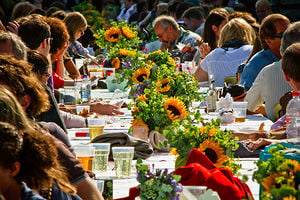
This page is the beginnings of a portal for Community involvement. The majority of our information about this is collated via our place pages ...Near you.
An empowered, self-actualized community of active citizens enriches and sustains the quality of life of all who live there.
Community involvement is used here as a deliberatly broad term to include for example Participatory W and Deliberative democracy. W
"World loses faith in democracy": Worldwide, 57.5% of citizens in the nations studied (Jan 2020) indicated they were not satisfied. Back in 2005, that was just 38.7%.[1]
Community involvement is about people and communities being able to play a full part in decision-making, for example local decision-making, and so influence the decisions which affect their lives. It is also about community empowerment, for example through access to appropriate information and adivce.
Proper community involvement is not tokenistic. Instead it is on-going, valued, meaningful, provides extensive opportunity and is genuinely and extensively influential.
Proper community involvement is not about allowing mere comment on decisions that have already largely been taken. Instead it begins at the design stage, the very beginning of any project or programme.
Proper community involvement does not include measures of success being foisted upon the community, or worse still simply being ignored. Instead it gives a primary role to the community in judging how successful a project or programme has been.
Community involvement and civic participation can become transformational as the fertile ground or seedbed from which self-organising, autonomous networks growing their own agency spring.
News, topic, and resource articles[edit | edit source]
Community action projects[edit | edit source]
- create or develop Location, projects or networks pages, eg 'Sustainable (Your town)', in this wiki
- Participatory carbon budgeting
- Participatory budgeting
- Citizens' assembly
- Peoples assemblies
- Participatory or citizen journalism
- Street parties
- Local quality of life conferences
- Democracy festivals and Community involvement weeks
- Youth Fora
- promote and practice Open conference design
- advocate Open involvement
- Citizen Science
Events[edit | edit source]
 Sep 23, 2023 (Sat) — European Day of Sustainable Communities, communitiesforfuture.org
Sep 23, 2023 (Sat) — European Day of Sustainable Communities, communitiesforfuture.org
 May 3 - 5, 2024 (Fri - Sun) — Jane's Walk, How to Lead a Jane's Walk, Video
May 3 - 5, 2024 (Fri - Sun) — Jane's Walk, How to Lead a Jane's Walk, Video Oct 10, 2024 (Thu) — World Homeless Day
Oct 10, 2024 (Thu) — World Homeless Day Dec 09, 2024 (Mon) — International Anti-Corruption Day
Dec 09, 2024 (Mon) — International Anti-Corruption Day
Coproduction[edit | edit source]
The co-production of public services has been defined in a variety of ways - e.g. "Co-production means delivering public services in an equal and reciprocal relationship between professionals, people using services, their families and their neighbours" (new economics foundation) or "the public sector and citizens making better use of each other's assets and resources to achieve better outcomes and improved efficiency" (Governance International).
Experiments on co-production on public services have been launched in many countries, from Denmark to Malaysia, the UK and the USA. W
Participatory budgeting[edit | edit source]
Main article: Participatory budgeting
Participatory budgeting (PB) is a process of democratic deliberation and decision-making, and a type of participatory democracy, in which ordinary people decide how to allocate part of a municipal or public budget. Participatory budgeting allows citizens to identify, discuss, and prioritize public spending projects, and gives them the power to make real decisions about how money is spent. When PB is taken seriously and is based on mutual trust local governments and citizen can benefit equally. In some cases PB even raised people's willingness to pay taxes.
Participatory budgeting generally involves several basic steps: 1) Community members identify spending priorities and select budget delegates 2) Budget delegates develop specific spending proposals, with help from experts 3) Community members vote on which proposals to fund 4) The city or institution implements the top proposals
A comprehensive case study of eight municipalities in Brazil analyzing the successes and failures of participatory budgeting has suggested that it often results in more equitable public spending, greater government transparency and accountability, increased levels of public participation (especially by marginalized or poorer residents), and democratic and citizenship learning. W
Participatory carbon budgeting[edit | edit source]
See separate article: Participatory carbon budgeting
Participatory democracy[edit | edit source]
Participatory democracy strives to create opportunities for all members of a population to make meaningful contributions to decision-making, and seeks to broaden the range of people who have access to such opportunities. In 2011, considerable grassroots interest in participatory democracy was generated by the Occupy movement. W
Participatory justice[edit | edit source]
Participatory justice is the use of alternative dispute resolution, such as mediation, conciliation, and arbitration, in criminal justice systems, instead of, or before, going to court. It is sometimes called "community dispute resolution". W
Participatory planning[edit | edit source]
Participatory planning is an urban planning paradigm that emphasizes involving the entire community in the strategic and management processes of urban planning; or, community-level planning processes, urban or rural. It is often considered as part of community development. Participatory planning aims to harmonize views among all of its participants as well as prevent conflict between opposing parties. In addition, marginalized groups have an opportunity to participate in the planning process. W
Democracy festivals[edit | edit source]
Democracy Festivals Association (International) added 16:10, 30 June 2020 (UTC)
Rio Declaration on Environment and Development[edit | edit source]
The Rio Declaration of 1992 enshrines public participation in its 27 principles. Principle 10 states that "environmental issues are best handled with participation of all concerned citizens, at the relevant level”. The Rio Declaration continues, drawing a close link between access to information and public participation:
"At the national level, each individual shall have appropriate access to information concerning the environment that is held by public authorities, including information on hazardous materials and activities in their communities, and the opportunity to participate in decision-making processes. States shall facilitate and encourage public awareness and participation by making information widely available. Effective access to judicial and administrative proceedings, including redress and remedy, shall be provided." W
Near you[edit | edit source]
Community involvement UK - Community involvement USA
See also[edit | edit source]
- Community involvement news
- Resources for community involvement
- CAN handbook and guide
- Arts, sport and culture
- Citizen centred participation
- Citizens data initiative
- Citizens' assembly
- Communities online
- Community and voluntary action
- Community resources
- Extinction Rebellion, XR and future democracy
- Getting to know your locality, Getting to know your region
- Localism
- Maps for community action
- Networks
- Open conference design
- Open involvement
- Participatory budgeting, Participatory carbon budgeting
- Participatory Practices for Sustainable Development (Village Earth, 2006), Participatory Monitoring and Evaluation, Participatory Impact Pathways Analysis, Participation
- Peoples assemblies
- Quotes about community action and the power of community
- Recognising quiet members in community groups
- Rural sustainability
- Towards sustainable economies
- Urban sustainability
- Video for community action
External links[edit | edit source]
section updated 12:32, 15 February 2020 (UTC)
- Wikipedia:
Participatory democracy W, Open-source governance W, .green W, Participatory budgeting W, Participatory planning W, Participatory justice W, Public participation W, Coproduction (public services) W, Popular assembly W, Neighborhood council W, Democracy Index W
- Democracies Online, builds online public space in the heart of real democracy and community. "Our mission is to harness the power of online tools to support participation in public life, strengthen communities, and build democracy."
- Eroles Project
- Foundation for Democracy and Sustainable Development
- Democracy Earth
- Open311, collaborative model and open standard for civic issue tracking
- OpeningParliament.org, forum intended to help connect the world's civic organizations engaged in monitoring, supporting and opening up their countries' parliaments and legislative institutions.
- Open Government Initiative
- Green Drinks international Organic, self-organising network of people who meet up monthly for a beer at informal sessions known as Green Drinks.
- Meetup Free service that organizes local gatherings about anything, anywhere. Topic groups include 'New Urbanism and Sustainable Development'







